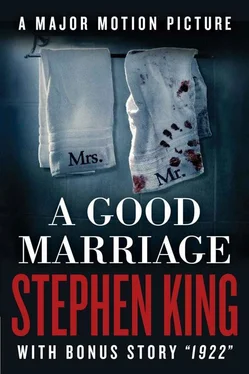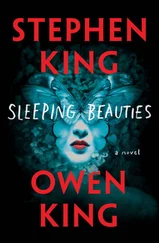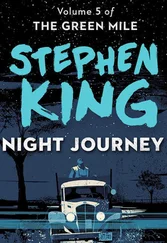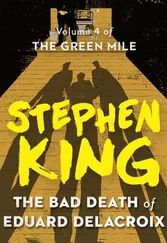So I thought then.
* * *
In the years between 1916 and 1922, even stupid Nebraska farmers prospered. Harlan Cotterie, being far from stupid, prospered more than most. His farm showed it. He added a barn and a silo in 1919, and in 1920 he put in a deep well that pumped an unbelievable six gallons per minute. A year later, he added indoor plumbing (although he sensibly kept the backyard privy). Then, three times a week, he and his womenfolk could enjoy what was an unbelievable luxury that far out in the country: hot baths and showers supplied not by pots of water heated on the kitchen stove but from pipes that first brought the water from the well and then carried it away to the sump. It was the showerbath that revealed the secret Shannon Cotterie had been keeping, although I suppose I already knew, and had since the day she said, He’s sparked me, all right —speaking in a flat, lusterless voice that was unlike her, and looking not at me but off at the silhouettes of her father’s harvester and the gleaners trudging behind it.
This was near the end of September, with the corn all picked for another year but plenty of garden-harvesting left to do. One Saturday afternoon, while Shannon was enjoying the showerbath, her mother came along the back hall with a load of laundry she’d taken in from the line early, because it was looking like rain. Shannon probably thought she had closed the bathroom door all the way—most ladies are private about their bathroom duties, and Shannon Cotterie had a special reason to feel that way as the summer of 1922 gave way to fall—but perhaps it came off the latch and swung open partway. Her mother happened to glance in, and although the old sheet that served as a shower-curtain was pulled all the way around on its U-shaped rail, the spray had rendered it translucent. There was no need for Sallie to see the girl herself; she saw the shape of the girl, for once without one of her voluminous Quaker-style dresses to hide it. That was all it took. The girl was five months along, or near to it; she probably could not have kept her secret much longer in any case.
Two days later, Henry came home from school (he now took the truck) looking frightened and guilty. “Shan hasn’t been there the last two days,” he said, “so I stopped by Cotteries’ to ask if she was all right. I thought she might have come down with the Spanish Flu. They wouldn’t let me in. Mrs. Cotterie just told me to get on, and said her husband would come to talk to you tonight, after his chores were done. I ast if I could do anything, and she said, ‘You’ve done enough, Henry.’”
Then I remembered what Shan had said. Henry put his face in his hands and said, “She’s pregnant, Poppa, and they found out. I know that’s it. We want to get married, but I’m afraid they won’t let us.”
“Never mind them,” I said, “ I won’t let you.”
He looked at me from wounded, streaming eyes. “Why not?”
I thought: You saw what it came to between your mother and me and you even have to ask? But what I said was, “She’s 15 years old, and you won’t even be that for another two weeks.”
“But we love each other!”
O, that loonlike cry. That milksop hoot. My hands were clenched on the legs of my overalls, and I had to force them open and flat. Getting angry would serve no purpose. A boy needed a mother to discuss a thing like this with, but his was sitting at the bottom of a filled-in well, no doubt attended by a retinue of dead rats.
“I know you do, Henry—”
“ Hank! And others get married that young!”
Once they had; not so much since the century turned and the frontiers closed. But this I didn’t say. What I said was that I had no money to give them a start. Maybe by ’25, if crops and prices stayed good, but now there was nothing. And with a baby on the way—
“There would be enough!” he said. “If you hadn’t been such a bugger about that hundred acres, there’d be plenty ! She would’ve given me some of it! And she wouldn’t have talked to me this way!”
At first I was too shocked to say anything. It had been six weeks or more since Arlette’s name—or even the vague pronounal alias she —had passed between us.
He was looking at me defiantly. And then, far down our stub of road, I saw Harlan Cotterie on his way. I had always considered him my friend, but a daughter who turns up pregnant has a way of changing such things.
“No, she wouldn’t have talked to you this way,” I agreed, and made myself look him straight in the eye. “She would have talked to you worse. And laughed, likely as not. If you search your heart, Son, you’ll know it.”
“No!”
“Your mother called Shannon a little baggage, and then told you to keep your willy in your pants. It was her last advice, and although it was as crude and hurtful as most of what she had to say, you should have followed it.”
Henry’s anger collapsed. “It was only after that… after that night… that we… Shan didn’t want to, but I talked her into it. And once we started, she liked it as much as I did. Once we started, she asked for it.” He said that with a strange, half-sick pride, then shook his head wearily. “Now that hundred acres just sits there sprouting weeds, and I’m in Dutch. If Momma was here, she’d help me fix it. Money fixes everything, that’s what he says.” Henry nodded at the approaching ball of dust.
“If you don’t remember how tight your momma was with a dollar, then you forget too fast for your own good,” I said. “And if you’ve forgotten how she slapped you across the mouth that time—”
“I ain’t,” he said sullenly. Then, more sullenly still: “I thought you’d help me.”
“I mean to try. Right now I want you to make yourself scarce. You being here when Shannon’s father turns up would be like waving a red rag in front of a bull. Let me see where we are—and how he is—and I may call you out on the porch.” I took his wrist. “I’m going to do my best for you, Son.”
He pulled his wrist out of my grasp. “You better.”
He went into the house, and just before Harlan pulled up in his new car (a Nash as green and gleaming under its coating of dust as a bottlefly’s back), I heard the screen door slam out back.
The Nash chugged, backfired, and died. Harlan got out, took off his duster, folded it, and laid it on the seat. He’d worn the duster because he was dressed for the occasion: white shirt, string tie, good Sunday pants held up by a belt with a silver buckle. He hitched at that, getting the pants set the way he wanted them just below his tidy little paunch. He’d always been good to me, and I’d always considered us not just friends but good friends, yet in that moment I hated him. Not because he’d come to tax me about my son; God knows I would have done the same, if our positions had been reversed. No, it was the brand-new shiny green Nash. It was the silver belt buckle made in the shape of a dolphin. It was the new silo, painted bright red, and the indoor plumbing. Most of all it was the plain-faced, biddable wife he’d left back at his farm, no doubt making supper in spite of her worry. The wife whose sweetly given reply in the face of any problem would be, Whatever you think is best, dear. Women, take note: a wife like that never needs to fear bubbling away the last of her life through a cut throat.
He strode to the porch steps. I stood and held out my hand, waiting to see if he’d take it or leave it. There was a hesitation while he considered the pros and cons, but in the end he gave it a brief squeeze before letting loose. “We’ve got a considerable problem here, Wilf,” he said.
“I know it. Henry just told me. Better late than never.”
Читать дальше











